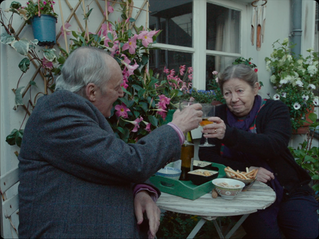Wings of Desire
- Michelle Bernstein
- Feb 9, 2022
- 4 min read
Wim Wenders, 1987

They all have tired mouths
And luminous, illimitable souls;
And a longing (as if for sin)
Trembles at times through their dreams.
– Rainer Maria Rilke, ‘The Angels’
When Bruno Ganz passed away in the winter of 2019, I frequently took the bus from Alexanderplatz way past the Philharmony because it took a route past the Victory Column, the statue at the beginning of Wings of Desire. I’d sit and stick my head as close to the window as possible, looking like a tourist; as if seeing the angelic monument for the first time. Wings of Desire first and foremostly reminds me of home, and I like to perceive my hometown in no other way than through the scenes of this film. The sequence of Bruno Ganz in his long coat, glooming wings, standing on an edge of a building looking over the city has been an image that has been following me subconsciously since childhood. When I first caught glimpses of the film on TV late at night, I carried it with myself in the back of my mind. I felt a certain intrigue towards what also intimidated me as a child. To get even a little glimpse of this world at that age was somehow a very special and beautiful experience, despite how insignificant it may have seemed at that time. I didn’t see the film again until I was fifteen years old, and ever since I try to keep it very close to me and rewatch it every now and then. I like to think of the image of Bruno Ganz as a good omen. Coming back to it always feels like coming home. I look at Berlin through the eyes of angels and see goodness in people. I think of beginnings, patience and light. It makes me feel sentimental and nostalgic. Everything was different and I was not there to experience it, and yet I feel very strongly drawn to it. By recognizing the streets, buildings, and bridges in the film – every time I walk past them I find myself transported into the world of angels. I find myself longing for a Berlin that no longer exists, reminiscing of a place that once was.
Wings of Desire ties together many things I love. It wasn't until recently that I found out that the angelic choirs in the film score were composed and conducted by Laurie Anderson. Adding to that, Peter Falk's performance; in particular when he talks about how fantastic it is to smoke cigarettes and drink coffee at the same time. After seeing that scene I never looked at a cup of coffee the same way again. Nick Cave performing From Here to Eternity; the film’s dedication ‘to all the former angels, but especially to Yasujiro, François and Andrej.’ Like a cluster of my favourite things which miraculously crossed each other’s paths, the result changed my perspective on my hometown in a way I wish I knew how to properly put into words. I’m forever changed by it and thankful for it; I could host a dinner and invite every person I love just to celebrate my love for it.
It is a genuine homage to the people of Berlin. One could easily describe it as a cinematic personification of love in all its forms, from its first seconds to its very last. The lead character, Damiel, wanders aimlessly around the city almost as I would on a regular weekend in the company of my friends. He is a witness. The film's dreamlike imagery perfectly mirrors the lonesomeness and alienation that one experiences from being overwhelmed by the simplicity of everyday life. When I walk around Berlin, the same way these angels do, it is mostly the string of connection that ties together the small things that warm my heart. From the cheap coffee from a bodega, shared with a childhood friend, then unexpected snow, a stranger on the subway reading my favourite book. I was born here, I have lived my entire life here. All love, all sorrow.
One ponders, how do I belong here? Where is my place embedded in the prevailing yesterday, yet ever-changing tomorrow of the city? Sometimes a row of small joy can be tied together so easily. As Damiel, the angel, lists the things he would like to feel and experience – to have a fever, to come home like Raymond Chandler’s Philip Marlowe to feed the cat, to have fingers stained by reading the newspaper, to be excited not only by spiritual things but by a meal – a seemingly heavy piece of cinema untangles into a celebration of smallness. Existence, to the angels who are destined to observe history from beginning to end, is too a contemplation of meaning. Who are we to ask for more?
And what an idea, to be surrounded by angels. In our quietest moments, there are angels putting their palms to our cheek, though their choir echoes with alienation and foolish envy of which we cannot possibly know. There is a scene in which Bruno Ganz's angel comforts a dying man, casting graceful moments like spells. "The old houses of Charlottenburg. Albert Camus. The morning light. The child's eyes. The spots of the first drops of rain. The dream of the house in the house. The beautiful stranger. My father. My mother. My wife. My child." Simple things will ultimately strike us as much as our most tender and intimate thoughts. When Wim Wenders explained how he came up with the idea of making a film about angels, he wrote “Reading Rilke every night, perhaps I got used to the idea of angels being around.”








Comments